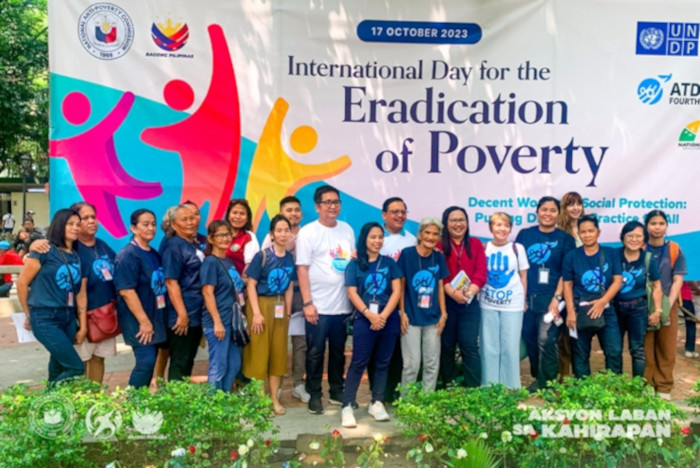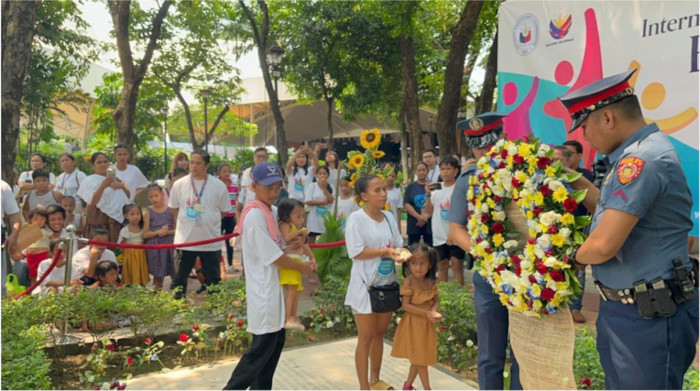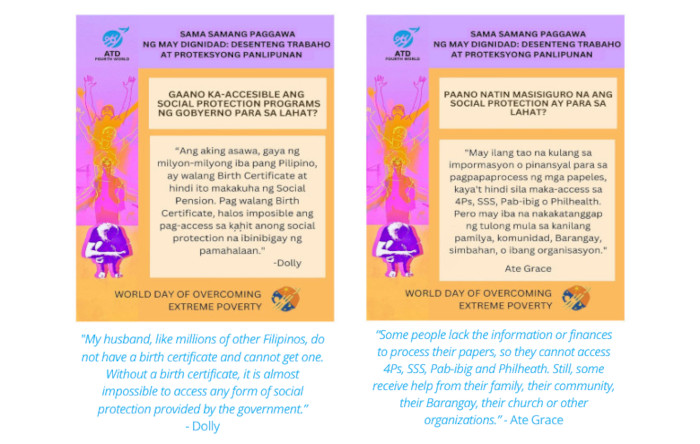Celebration and Social Change at Rizal Park

“Wherever men and women are condemned to live in extreme poverty, human rights are violated. To come together to ensure that these rights be respected is our solemn duty.”
These are the words of ATD founder, Joseph Wresinski, inscribed on the commemorative stone at the heart of the Human Rights Plaza in Paris. Unveiled in 1987 the stone marked the first celebration of October 17 as the International Day for the Eradication of Poverty. This would later be recognized by the UN in 1992. On this day, each year, people across the world, gather to recognize the experiences of those living in poverty. While every place celebrates the day differently, they are all united by a common theme. The theme for 2023 was “Decent Work and Social Protection for All“.
In the Philippines, the country has recognized October 17 as a national day since 1993 and commemorates it with a week of action, activities, and learning, culminating in a celebration at Rizal Park in Manila.
ATD in the Philippines
ATD’s mission in the Philippines began in 1987. Presently, the team, with the support of community facilitators and ATD friends, works closely with marginalized communities particularly those in Manila North Cemetery, conducting programs geared towards to strengthening the community.
Ang Galing which means “Awesome” in Filipino, is a program organized in the cemetery with volunteers and long-term friends of ATD. This program, held three Saturdays each month during the school year, is designed to help children with their basic reading and writing skills. Moreover, the program aims to build confidence in children who have major difficulties at school and assist them in developing an interest in reading and learning.
Sulong which translates to “let’s move forward” is another program ATD coordinates in the Manila North Cemetery. Established to encourage those living in poverty to save a small sum of money each week (with no paper or minimum amount required), participants put money aside for medical or school expenses, baptism celebrations, or emergencies.
For those experiencing poverty, ATD Philippines works to support both personal and community development by setting up these grassroots programs.
Ensuring the involvement of community members in the running of these programs allows the programs to become a part of the community.
All Hands on Deck
In collaboration with the National Anti-Poverty Commission (NAPC), the ATD Forum Committee comprises ATD Volunteer Corps members, community facilitators, and friends, and was established to oversee the organization of October 17.
The NAPC was formed as part of the Philippines’ “Social Reform and Poverty Alleviation Act” and is dedicated to the eradication of poverty in the Philippines through poverty advocacy oversight of various anti-poverty efforts. To prepare for October 17, the Forum Committee began regular meetings with the NAPC Policy and Planning Service team in June. Over 1,100 participants from ATD members, NGOs, government agencies, and other members of the community took part in the commemoration at Rizal Park. Performances, prayers, activities, and workshops marked the day.
The workshops, which followed the 2023 theme, “Decent Work and Social Protection for All”, were organized by NAPC partners who offered national ID registration services and responded to birth certificate inquiries. Alongside these services, workshops were conducted on basic hair-cutting training, candle and soap-making, and cooking demonstrations; providing the participants with applicable skills to allow them to find work or even set up small businesses.
Several ATD community partners also played an active role in the day’s performances and activities. Notably, there were music performances and prayers from Minstrels Rhythm of Hope, ISKCON Manila Philippines and OPM: 13. In the afternoon, both Minstrels Rhythm of Hope and the Waldorf School of Manila offered workshops for the children.
The other highlight of the festivities was a wreath-laying ceremony at the commemorative stone in Rizal Park. This was carried out by Ate Jackielyn and her family on behalf of all the families living in poverty.

The Voices of the Most Vulnerable
In the months leading up to October 17, members of the Forum Committee interviewed over 35 people with lived experience of poverty in various communities on the theme, “Decent Work and Social Protection for All”. The interviews covered one of three topics: 4Ps (conditional cash grants); social pension, and job and social benefits. They also touched upon the importance of social protection to support the education of the children.
In the week leading up to Oct 17, selected testimonies were posted daily on Facebook, reaching an estimated 5000 people. On the commemoration day, posters of the testimonies were hung up at Rizal Park, putting the experiences of those living in poverty at the heart of the commemoration.
Some of the testimonies can be seen below here:

On stage, each of the five ATD community facilitators read a passage from these testimonies. These messages highlighted the difficulty of obtaining a birth certificate, one of the main barriers to social protection. Over five million people in the Philippines do not have a birth certificate, and this leads to complications when trying to access social welfare benefits.
A testimony from community member Ate Vivian highlighted this issue:
“I have neither a birth certificate nor ID. My children also do not have a birth certificate. One of my kids was born in a [tricycle taxi] while the other one I had to deliver by myself in the chapel nearby. I do not have money to go to the hospital.”
One of the common social welfare programs frequently mentioned in these messages was 4Ps. 4Ps is a conditional cash transfer program in the Philippines which provides funds to the poorest households to help members improve their health, nutrition, and assist with their children’s education. The conditions include school enrollment, which requires a birth certificate.
Many people also voiced their concerns about the inadequacy of the funds provided by 4Ps, especially when they needed for medical checkups, which is another condition of 4Ps. A testimony from Ate Joan illustrated this:
“I was told I could include [the baby] because [she] requires follow-ups at the clinic. I am not sure whether 4Ps monitors this. The payout remains inadequate. When we go for checkups, we pay on our own. I save money specifically on medications. That’s it.”
Sana, a friend of ATD, gave a speech echoing the sentiments of community messages and emphasized the important role 4Ps plays as a stepping stone to good education. At the same time, she called for the members of the government agencies present to reflect on the concerns of community members with their experiences of 4Ps.
In response, a member of the Department of Social Welfare recognized the concern of community members and emphasized the need for collaborative action between the government, private sector, and international organizations, to further alleviate the effects of poverty.
Many members of the community strive to provide a good education for their children. This was addressed in the testimony by Kuya Mario who explained:
“My dream is for my children to graduate. My children’s education is my only legacy. It is difficult but when I have my earnings, I support them in their school projects. Otherwise, I tell them to wait till next time. They find ways, sometimes, they ask their classmates for help.”
The commemoration of October 17 in the Philippines is not just a moment to reflect on the experiences of poverty but of actionable change. The preparation for the Rizal Park celebration, along with the community interviews, has created an opportunity for community action and engagement. By attending, participants are taking the steps necessary toward the eradication of poverty.

